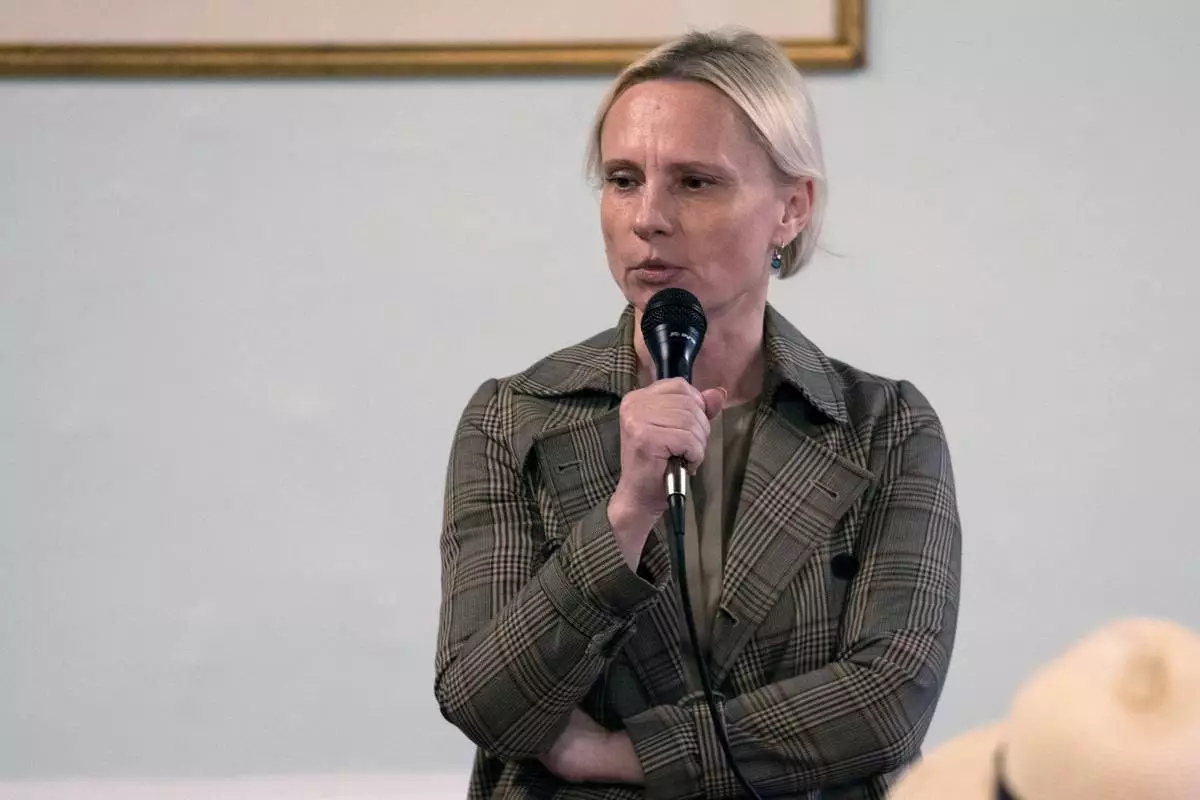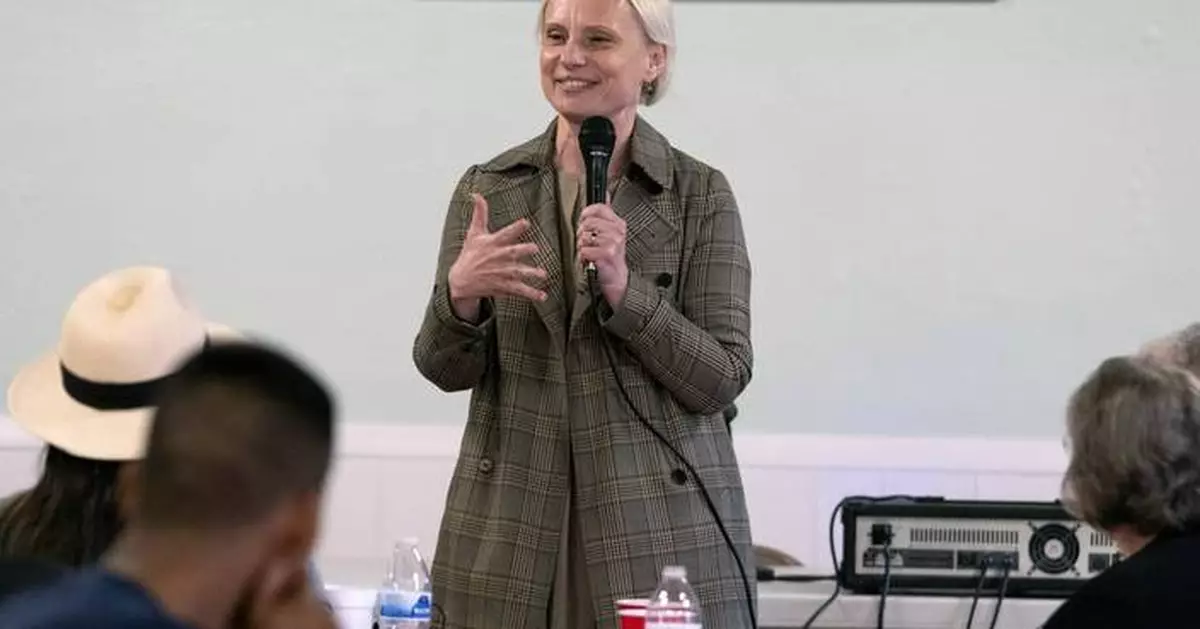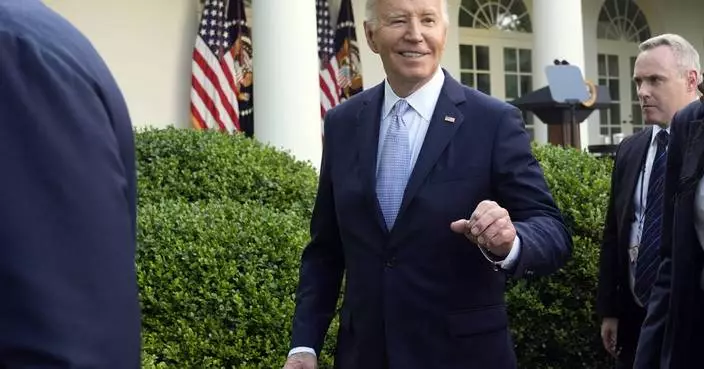SHERIDAN, Ind. (AP) — U.S. Rep. Victoria Spartz, the first and only Ukrainian-born member of Congress, emerged early on as a natural advocate for supporting her native country in its war with Russia. But when $61 billion in additional support for the war effort came up for a vote in the House recently, she voted against it.
Instead she has called for better oversight of U.S. funds and opposed giving “blank checks” to the Ukrainian cause. She says U.S. border security should be a bigger priority.
That puts her more in line with conservative House Republicans and more notably with voters in her deeply conservative central Indiana congressional district. She's locked in a tough reelection fight in the May 7 GOP primary, made all the more complicated by her public announcement more than a year ago that she wouldn't seek another term, a decision she later reversed.
The aid package, part of a larger bill that also included assistance for Israel, Taiwan and other global hot spots, was approved by the House on April 20, the Senate on Tuesday and signed into law by President Joe Biden on Wednesday.
Spartz said she is “kind of appalled” at the notion that her heritage should dictate support for the Ukrainian cause if she feels the money would be wasted.
“My responsibility is the protection of American people,” she said during a recent interview.
Spartz spoke at an event hosted by the Hamilton County GOP at a community center in Sheridan, Indiana, a town of a few thousand people. The event in a hall just off of the town's main street was attended by eight of the nine GOP primary candidates, who were able to make their case to voters and county Republican officials one at a time during a meet-and-greet that also included short speeches by the candidates.
Mike Murphy, a former Indiana state representative and political commentator, said in a phone interview that funding for Ukraine isn't much of a priority for Republican voters these days. Concern about the southern border is a greater catalyst for participation, which isn't lost on candidates in the conservative district. Most of Spartz's opponents for the 5th district seat have said protecting the U.S.-Mexico border should be a bigger priority than sending money to Ukraine.
“They’re all gunning to be as Trump-like as possible,” Murphy said.
Border security has been hammered in the campaign by state Rep. Chuck Goodrich, the most well-funded of Spartz's eight challengers. He has attacked Spartz on her original support to Ukraine, saying she puts “Ukraine first.”
Goodrich, who attended the Sheridan event, acknowledged that Indiana is far from Mexico but said illegal drugs such as fentanyl enter the U.S. through the southern border and pose a threat deep in the heartland.
“Every state is a border state,” he said in an interview.
Spartz beat a crowded 2020 primary field, winning nearly 40% of the vote and receiving former President Donald Trump's general election endorsement. She ran unopposed in the 2022 primary.
Spartz made things harder for herself when she announced in early 2023 that she would not run again, citing fatigue with Washington politics and her desire to spend more time with her family. She also threatened to resign if the national debt was not addressed.
For an entire year, that left the runway clear for candidates to campaign in one of most conservative districts in the state, composed of a mix of rural and suburban counties north of Indianapolis. Trump took the district in 2020, and it was redistricted to further favor Republicans that same year.
Campaign finance reports show Spartz trailing Goodrich in campaign funds, in part because Goodrich has put up $2.6 million of his own money. Goodrich, who represents the wealthy Indianapolis suburb of Hamilton County in the state legislature, outspent Spartz by $1.9 million in the first three months of 2024 and has loaned his campaign a total of $4.6 million, according to reports.
Spartz entered the final weeks before the primary with $134,000 of cash on hand compared to Goodrich's $1.3 million.
Trump has not made an endorsement in the 5th district this year. He's been ambivalent about aid to Ukraine, saying the war would not have happened if he had been president and that any support should take the form of loans rather than grants.
Even with Spartz’s short campaign runway, she retains the advantage of incumbency. She has accused Goodrich of cozying up to China and labeled him “Republican in Name Only.”
With Trump’s Republican nomination for the presidency secured, turnout is expected to be low.
Spartz, 45, immigrated to the U.S. in 2000 after meeting her husband from Indiana on a train in Europe. She started as a bank teller, later taught as an adjunct faculty member at Indiana University’s Kelley School of Business and owns farm property.
After a long-time state senator retired before the end of his term, Hamilton County GOP officials selected Spartz, who was involved with the county party, to fill his term in 2017. She served three sessions in the statehouse before her election to Congress.
In an emotional news conference in 2022, Spartz called Russia’s invasion of Ukraine a “ genocide.” She described bombings her grandmother and friends in Ukraine had witnessed.
Later that year, she began to criticize Ukraine's leaders, including President Volodymyr Zelensky.
In the Sheridan interview, Spartz said “brave people” are “dying for freedom” in Ukraine but accused the Ukrainian government of corruption.
During her speech to voters, Spartz made no mention of the war in Ukraine. Instead she framed the stakes of her reelection as a fight against party hypocrisy, saying some of her fellow Republicans act like socialists.
Drawing on her experience growing up in the Soviet Union, as she has often done throughout her political career, she warned of a socialist future in the United States.
“I’m going to fight the righteous fight," she declared.
—-
A previous version of this story incorrectly said former President Donald Trump endorsed Spartz in the 2020 Republican Primary. He endorsed her in the general election.

Rep. Victoria Spartz, R-Ind., speaks during a Northern Hamilton County GOP Meeting, Monday, April 22, 2024, in Sheridan, Ind. Spartz, the first and only Ukrainian-born member of Congress who emerged as a natural voice for Ukraine, recently voted against sending $61 billion of aid to the country. Her reversal aligns with other hard-right Republicans in the House. Thanks to a year off from campaigning, Spartz's district in central Indiana is vulnerable in the upcoming primary election where the U.S.-Mexico border is of top concern. (AP Photo/Darron Cummings)

Rep. Victoria Spartz, R-Ind., speaks during a Northern Hamilton County GOP Meeting, Monday, April 22, 2024, in Sheridan, Ind. Spartz, the first and only Ukrainian-born member of Congress who emerged as a natural voice for Ukraine, recently voted against sending $61 billion of aid to the country. Her reversal aligns with other hard-right Republicans in the House. Thanks to a year off from campaigning, Spartz's district in central Indiana is vulnerable in the upcoming primary election where the U.S.-Mexico border is of top concern. (AP Photo/Darron Cummings)
In an isolated part of the U.S. Drug Enforcement Administration headquarters known as the 12th-floor “bubble,” chief Anne Milgram made an unusual request of top deputies summoned in March for what she called the “Marijuana Meeting”: Nobody could take notes.
Over the next half hour, she broke the news that the Biden administration would soon be issuing a long-awaited order reclassifying pot as a less-dangerous drug, a major hurdle toward federal legalization that DEA has long resisted. And Milgram went on to reveal another twist, according to two people familiar with the private meeting who spoke to The Associated Press on condition of anonymity, that the process normally steered by the DEA had been taken over by the U.S. Justice Department and the action would not be signed by her but by Attorney General Merrick Garland.
Milgram didn't give aides a reason for the unprecedented omission and neither she nor the DEA has explained since. But it unfolded this past week exactly as laid out in that meeting two months ago, with the most significant drug policy change in 50 years launched without the support of the nation’s premier narcotics agency.
“DEA has not yet made a determination as to its views of the appropriate schedule for marijuana,” reads a sentence tucked 13 pages into Garland’s 92-page order last Thursday outlining the Biden administration proposal to shift pot from its current Schedule I alongside heroin and LSD to the less tightly regulated Schedule III with such drugs as ketamine and some anabolic steroids.
Internal records accompanying the order indicate the DEA sent a memo to the Justice Department in late January seeking additional scientific input to determine whether marijuana has an accepted medical use, a key requirement for reclassification. But those concerns were overruled by Justice Department attorneys, who deemed the DEA’s criteria “impermissibly narrow.”
Several current and former DEA officials told the AP they believe politics may be at play, contending the Justice Department is moving forward with the marijuana reclassification because President Joe Biden wants to use the issue to woo voters in his re-election campaign and wasn’t willing to give the DEA time for more studies that likely would have dragged beyond Election Day.
Those officials also noted that while the Controlled Substances Act grants the attorney general responsibility for regulating the sale of dangerous drugs, federal law still delegates the authority to classify drugs to the DEA administrator.
“It’s crystal clear to me that the Justice Department hijacked the rescheduling process, placing politics above public safety,” said Derek Maltz, a retired agent who once headed the DEA’s Special Operations Division. “If there’s scientific evidence to support this decision, then so be it. But you’ve got to let the scientists evaluate it.”
Former DEA Administrator Tim Shea said the striking absence of Milgram’s sign-off suggests she was backing “the DEA professionals.”
“If she had supported it she would have signed it and sent it in,” said Shea, who served in the Trump administration. “DEA was opposed to this and the politics entered and overruled them. It’s demoralizing. Everybody from the agents in the streets to the leadership in DEA knows the dangers this brings.”
The White House did not respond to a request for comment but Press Secretary Karine Jean-Pierre previously said Biden was committed to fulfilling a 2020 campaign promise. “He said no person, no American who possesses marijuana should go to jail. It is affecting communities across the country, including communities of color.”
Justice Department attorneys defended Garland’s decision to proceed without Milgram’s backing, saying in a separate memo that the action was prompted by “sharply different views” between DEA and the Department of Health and Human Services. The HHS last year recommended reclassifying marijuana, deeming it less risky to public health than cocaine, heroin and oxycodone, and effective in treating anorexia, pain and other ailments.
HHS concluded in part that “although abuse of marijuana produces clear evidence of a risk to public health, that risk is relatively lower than” that posed by other drugs.
The DEA balked at those findings and Garland’s order cites at least 10 times when the drug agency requested additional information before blessing HHS’ medical findings. It did not respond to AP questions seeking further comment.
The Justice Department didn't comment on internal differences but in a statement said that the proposal was “consistent with the scientific and medical determinations of HHS." The department added it was legally required to follow HHS’s scientific and medical findings that marijuana should be reclassified, at least until the start of the rulemaking process.
The dissonance within the federal government underscores the continuing debate over the risks posed by cannabis, even as 38 states have legalized medical marijuana and 24 have legalized its recreational use. All the while, more voters — 70% of adults, according to a Gallup poll last fall — support legalization, the highest level yet recorded by the polling firm.
“The argument that marijuana is as dangerous as fentanyl, cocaine and meth is laughable,” said Matthew C. Zorn, a Houston-based attorney who writes a newsletter on cannabis regulation. “The DEA isn’t where most Americans are. They’re standing on the wrong side of history.”
But even HHS’ National Institute on Drug Abuse has come out with statements in apparent conflict with HHS’ recommendation to reclassify pot, saying the potency of marijuana has been steadily increasing over the years, resulting in higher numbers of emergency room visits to treat a wide range of physical and mental effects, from breathing problems and mental impairment to hallucinations and paranoia.
“Whether smoking or otherwise consuming marijuana has therapeutic benefits that outweigh its health risks is still an open question that science has not resolved,” Nora Volkow, a neuroscientist who leads NIDA, is currently quoted as saying on the institute’s website. A NIDA spokesperson said rescheduling would facilitate research more into the drug.
The NIDA last performed a medical evaluation of marijuana in 2015 — a year before the Obama administration's DEA rejected a similar request to reschedule the drug.
This time, after Biden ordered a review of the drug’s status in 2022, HHS adopted new criteria to reach its rescheduling conclusion, taking into account the states that have already legalized medical marijuana.
The rescheduling move, first reported by the AP last month, faces a potentially lengthy process. The DEA, which must show “significant deference” to HHS' medical determinations, according to Justice Department attorneys, will now take public comment on the rescheduling plan before a review by an administrative judge and the publishing of a final rule. Federal prosecutions involving marijuana are already exceedingly rare but a Schedule III classification would still make pot a controlled substance subject to rules and regulations
For her part, Milgram has said little about her stance on marijuana and was not asked about it during her confirmation. When she took the helm of the agency in 2021, she privately told colleagues she considered the legalization debate a distraction from the far more serious fentanyl crisis, according to one of the people who spoke to the AP.
Milgram is known for a progressive, data-driven approach to law enforcement dating to her days as the Democratic attorney general of New Jersey. When the state’s governor, a close ally, signed a bill in 2010 making the state the 14th to make marijuana legal for medical purposes, she said only that the legislation was “workable.”
This past week, she was similarly opaque in a three-sentence announcement to DEA employees obtained by the AP.
“As required,” she wrote, “the DEA will post this notice and all attachments on our website.”
Goodman reported from Miami, Mustian from New York. AP Writer Lindsay Whitehurst in Washington contributed.
Contact AP’s global investigative team at Investigative@ap.org or https://www.ap.org/tips/

FILE - Attorney General Merrick Garland speaks during a news conference at Department of Justice headquarters in Washington, March 21, 2024. The Biden administration’s push to reclassify marijuana as a less-dangerous drug is going forward without the support of the nation’s premier narcotics agency. Newly released government records show the Drug Enforcement Administration requested more information on supporting science to reclassify marijuana but the Justice Department decided to move ahead without the drug agency’s signoff — an unprecedented omission. (AP Photo/Jose Luis Magana, File)

FILE - An indoor cannabis farm in Gardena, Calif., is seen, Aug. 15, 2019. The Biden administration’s push to reclassify marijuana as a less-dangerous drug is going forward without the support of the nation’s premier narcotics agency. Newly released government records show the Drug Enforcement Administration requested more information on supporting science to reclassify marijuana but the Justice Department decided to move ahead without the drug agency’s signoff — an unprecedented omission. (AP Photo/Richard Vogel, File)

FILE - DEA Administrator Anne Milgram speaks during a news conference at the Justice Department in Washington, Friday, April 14, 2023. The Biden administration’s push to reclassify marijuana as a less-dangerous drug is going forward without the support of the nation’s premier narcotics agency. Newly released government records show the Drug Enforcement Administration requested more information on supporting science to reclassify marijuana but the Justice Department decided to move ahead without the drug agency’s signoff — an unprecedented omission. (AP Photo/Susan Walsh, File)














